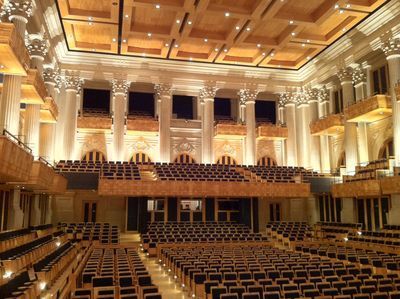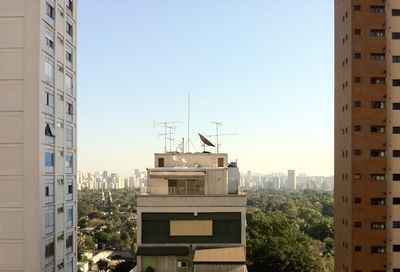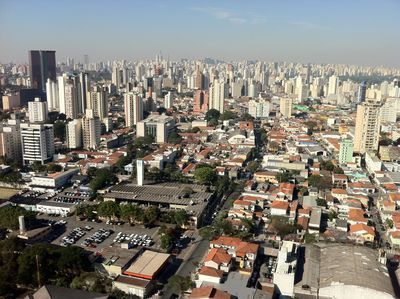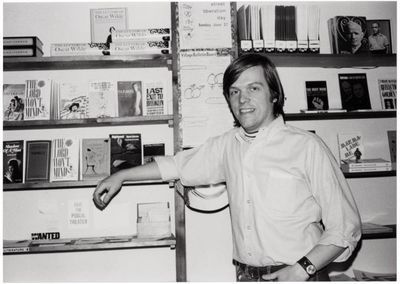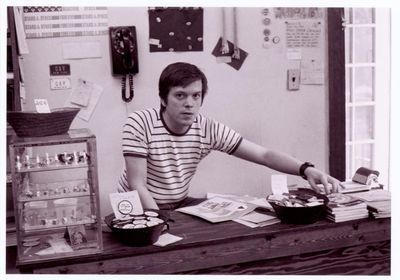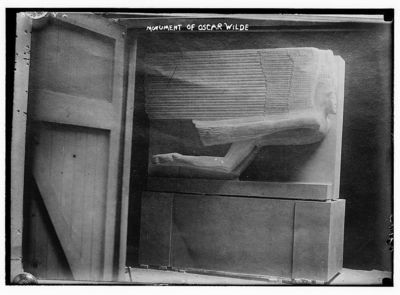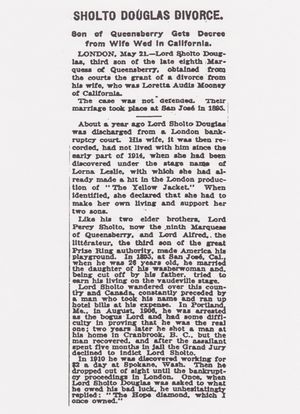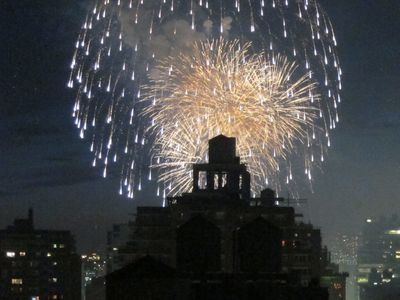Alex Ross's Blog, page 223
August 5, 2011
Sala São Paulo
The superb home of OSESP, the São Paulo State Symphony. It was formerly the Grand Hall of the São Paulo train station, which continues to operate next door.
August 4, 2011
Postcards from São Paulo
Postcard from São Paulo
August 1, 2011
Glass 75 (update)
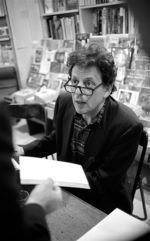 One of the most notable events of last season was Eighth Blackbird's Tune-In festival at the Park Avenue Armory. The 2012 edition has been announced: it will center on Philip Glass, who celebrates his 75th birthday on January 31. Glass and friends will take over the Armory from Feb. 23 to Feb. 26. The first concert will present a new Bill Frisell piece based on Allen Ginsberg's Kaddish, with Glass and others performing; the second will involve Patti Smith and her band; the third will consist of Glass's monumental Music in Twelve Parts; and the final concert will bring the New York premiere of the complete version of Glass's Another Look at Harmony, for organ and one hundred voices, a work begun back in 1975. Some other Glass birthday events on the horizon: the Days and Nights Festival in Carmel, California (Aug.-Sept.); the Double Timpani Concerto at the Cincinnati Symphony (Sept. 30 - Oct. 1); the New York Philharmonic's inaugural adventure in the world of Glass (Koyaanisqatsi, Nov. 2-3); the Met revival of Satyagraha (Nov. 4 - Dec. 1); the world premiere of the Ninth Symphony in Linz (Jan. 1); the American premiere of the Ninth at Glass's Carnegie birthday bash; another Cincinnati event, the world premiere of the Second Cello Concerto (March 30-31); the L.A. premiere of the Ninth with John Adams conducting (April 5-7); and, of course, the worldwide tour of Einstein on the Beach. The composer is now at work on two operas, The Lost and The Perfect American. He may be winning round 2 of the Minimalist Elder Statesman birthday battle with Steve Reich.
One of the most notable events of last season was Eighth Blackbird's Tune-In festival at the Park Avenue Armory. The 2012 edition has been announced: it will center on Philip Glass, who celebrates his 75th birthday on January 31. Glass and friends will take over the Armory from Feb. 23 to Feb. 26. The first concert will present a new Bill Frisell piece based on Allen Ginsberg's Kaddish, with Glass and others performing; the second will involve Patti Smith and her band; the third will consist of Glass's monumental Music in Twelve Parts; and the final concert will bring the New York premiere of the complete version of Glass's Another Look at Harmony, for organ and one hundred voices, a work begun back in 1975. Some other Glass birthday events on the horizon: the Days and Nights Festival in Carmel, California (Aug.-Sept.); the Double Timpani Concerto at the Cincinnati Symphony (Sept. 30 - Oct. 1); the New York Philharmonic's inaugural adventure in the world of Glass (Koyaanisqatsi, Nov. 2-3); the Met revival of Satyagraha (Nov. 4 - Dec. 1); the world premiere of the Ninth Symphony in Linz (Jan. 1); the American premiere of the Ninth at Glass's Carnegie birthday bash; another Cincinnati event, the world premiere of the Second Cello Concerto (March 30-31); the L.A. premiere of the Ninth with John Adams conducting (April 5-7); and, of course, the worldwide tour of Einstein on the Beach. The composer is now at work on two operas, The Lost and The Perfect American. He may be winning round 2 of the Minimalist Elder Statesman birthday battle with Steve Reich.
Craig Rodwell
In my Wilde essay in this week's New Yorker, I mention the Oscar Wilde Memorial Bookshop, which closed in 2009, after a historic four-decade run in Greenwich Village. In the online collection of the New York Public Library I found two photos of Craig Rodwell, the founder of the store. The first appears to date from 1971 (you can see Wilde's letters on the top shelf on the left), the second from 1973-74; both are by Kay Tobin Lahusen. Rodwell passed away in 1993. It always makes me happy to see the OSCAR WILDE sticker on the inside flap of one of my books — notably, a copy of Eve Sedgwick's Epistemology of the Closet that my shivering younger self bought in 1990.
July 31, 2011
Wilde
The Jacob Epstein sculpture that now marks Wilde's grave at Père Lachaise. From the Library of Congress.
In this week's issue of The New Yorker I have an essay on Oscar Wilde's The Picture of Dorian Gray. (Back in the nineties, I wrote sporadically on literary topics for the magazine; such work fell away when The Rest Is Noise took over my life, circa 2001. As a former English major, I'm happy to return to the fray.) In 2000 I wrote about Alfred Douglas, Wilde's odious lover. Let's hope that someone somewhere is working on a biography of perhaps the oddest member of the very odd Douglas line: Sholto Douglas, whose random life can be glimpsed in the Times piece below (click to enlarge). Connoisseurs of coincidence will note that the name Sholto appears in Arthur Conan Doyle's The Sign of Four, which was commissioned at the same dinner that elicited Dorian Gray.
Nightafternight playlist and reading list
— Rachmaninov, Preludes & Melodies; Alessio Bax (Signum)
— Louis Couperin, Pièces de Clavecin, complete; Richard Egarr (Harmonia Mundi)
— Steve Reich, WTC 9/11, Mallet Quartet, Dance Patterns; Kronos Quartet, So Percussion (Nonesuch)
— Beethoven, "Archduke" Trio, Mozart Quintet K. 593; Uchida, Kim, Soyer, and others live from Marlboro (ArkivMusic)
— Schubert, Ninth Symphony; Iván Fischer, Budapest Festival Orchestra (Channel Classics)
— Bach, Sinfonias and Concertos for oboe; Heinz Holliger, Erich Höbarth, Camerata Bern (ECM)
Summer reading: Gunther Schuller, A Life in Pursuit of Music and Beauty; Alan Hollinghurst, The Stranger's Child; Jeffrey Eugenides, The Marriage Plot; Amy Waldman, The Submission; Claudio Benzecry, The Opera Fanatic; Udo Bermbach, Richard Wagner in Deutschland; D. H. Lawrence, The Trespasser; E. M. Forster, The Longest Journey; Robert Kiely, Blessed and Beautiful: Picturing the Saints; etc.
Nigthafternight playlist and reading list
— Rachmaninov, Preludes & Melodies; Alessio Bax (Signum)
— Louis Couperin, Pièces de Clavecin, complete; Richard Egarr (Harmonia Mundi)
— Steve Reich, WTC 9/11, Mallet Quartet, Dance Patterns; Kronos Quartet, So Percussion (Nonesuch)
— Beethoven, "Archduke" Trio, Mozart Quintet K. 593; Uchida, Kim, Soyer, and others live from Marlboro (ArkivMusic)
— Schubert, Ninth Symphony; Iván Fischer, Budapest Festival Orchestra (Channel Classics)
— Bach, Sinfonias and Concertos for oboe; Heinz Holliger, Erich Höbarth, Camerata Bern (ECM)
Summer reading: Gunther Schuller, A Life in Pursuit of Music and Beauty; Alan Hollinghurst, The Stranger's Child; Jeffrey Eugenides, The Marriage Plot; Amy Waldman, The Submission; Claudio Benzecry, The Opera Fanatic; Udo Bermbach, Richard Wagner in Deutschland; D. H. Lawrence, The Trespasser; E. M. Forster, The Longest Journey; Robert Kiely, Blessed and Beautiful: Picturing the Saints; etc.
July 30, 2011
Bruckner extras (2)
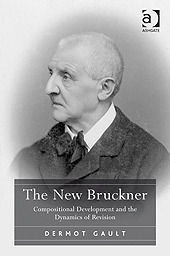 While working on this week's Bruckner column, I consulted John Williamson's Cambridge Companion to Bruckner, Julian Horton's Bruckner's Symphonies, and Benjamin Korstvedt's excellent short book on the Eighth Symphony, as well as classic older work by Robert Simpson and Deryck Cooke (some of whose conclusions no longer hold up). Korstvedt lucidly summarized the drift of modern Bruckner scholarship in a recent article for the New York Times. Dermot Gault's The New Bruckner, published last year by Ashgate, arrived as my article went to press, and I've been looking through it this week. Like Korstvedt, Gault questions the image of Bruckner as a naïve soul who let himself be bossed around by musical colleagues. The composer's unending work of revision, far from being a display of insecurity, was in fact integral to his development of new ideas of symphonic form. Gault also has a good section on the Finale of the Ninth Symphony, which he calls a "damaged fresco" — an excellent metaphor for the music that remains.
While working on this week's Bruckner column, I consulted John Williamson's Cambridge Companion to Bruckner, Julian Horton's Bruckner's Symphonies, and Benjamin Korstvedt's excellent short book on the Eighth Symphony, as well as classic older work by Robert Simpson and Deryck Cooke (some of whose conclusions no longer hold up). Korstvedt lucidly summarized the drift of modern Bruckner scholarship in a recent article for the New York Times. Dermot Gault's The New Bruckner, published last year by Ashgate, arrived as my article went to press, and I've been looking through it this week. Like Korstvedt, Gault questions the image of Bruckner as a naïve soul who let himself be bossed around by musical colleagues. The composer's unending work of revision, far from being a display of insecurity, was in fact integral to his development of new ideas of symphonic form. Gault also has a good section on the Finale of the Ninth Symphony, which he calls a "damaged fresco" — an excellent metaphor for the music that remains.
In an analysis of the Bruckner cult during the Third Reich, Gault defends the composer from the suspicion that he was any sort of extreme nationalist or fascist-in-the-making. Yet I wonder if Gault is a little too quick to separate Bruckner from anti-Semitic feeling. It's true that the most severe remark Bruckner made on the subject of the Jews seems to have been a question he posed to a Jewish student: "Tell me, do you really think that the Messiah has not come?" Not exactly Georg von Schönerer. Yet Margaret Notley, in a 2006 essay for 19th Century Music, points out that in 1891 Bruckner wrote a letter to the music critic Hans Puchstein thanking him for his "brilliant, splendid article" on the Third Symphony. As it happens, Puchstein's piece appeared on the front page of the notorious anti-Semitic paper Deutsches Volksblatt, in the company of a rant against the Rothschilds. Immediately below the review was a slogan in boldface: "Kauft nur bei Christen!" ("Buy only from Christians!"). So Bruckner could hardly have been unaware of the political leanings of some of his most vociferous fans.
There is certainly a nationalist strain in Bruckner's choral-orchestral setting Helgoland, his final completed piece. But the Ninth is something else again: a work resistant to affirmation, tilting toward tortured interior regions. Ludwig Wittgenstein was a Bruckner fan, and in the writings collected in Culture and Value he makes the fascinating, surprising observation that Bruckner's Ninth seems "a sort of protest against Beethoven's," comparing it to Lenau's Faust versus Goethe's. (The remark, from 1938, uncannily anticipates Thomas Mann's famous phrase about "taking back" the Ninth, in Doctor Faustus.) Two years before his death, Bruckner wrote in his diary, "Is that which Faith calls the immortal soul of man only an organic reaction of the brain?" What we know of the Ninth's Finale suggests that Bruckner was planning no simple, triumphal answers to such questions. Faith would have won out in the end, but not without an enormous struggle, bordering on madness. At the end of his life, Bruckner was seen reciting the Lord's Prayer at the top of his voice, repeating each line for emphasis. He is also said to have suggested that if he did not live to finish the Ninth then God would have only Himself to blame.
Alex Ross's Blog
- Alex Ross's profile
- 425 followers


